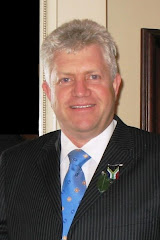
MEC Winde buys his ticket for the Choo-Tjoe
The return of the Outeniqua Choo-Tjoe celebration was held on 19 October 2009. Ms Cynthia Mgijima, Head: Transnet Foundation, performed the welcome address and dedicated the celebration to the operational return of the Outeniqua Choo-Tjoe, which had been discontinued for routine maintenance per regulator safety requirements on 30 June 2009.
Ms Mgijima said: "The first two restored coaches would be used today with the remaining three being completed by the end of the month. She also said: "Today demonstrated Transnet’s commitment to preserve the future of the Outeniqua Choo-Tjoe. She concluded by saying: "The Outeniqua Choo-Tjoe brings joy, hope and anticipation of change to ordinary people’s lives."
Mr Morne Hoogbaard, Acting Municipal Manager for Eden District Municipality said that the Outeniqua Choo-Tjoe will also be enjoyed by the 2010 supporters and the Eden District Municipality expresses their commitment to making sure that "the train will blow out steam." Mr Hoogbaard said: "The Eden District Municipality, in consultation with other municipalities, had agreed to the appointment of a project manager to facilitate funding for the Outeniqua Choo-Tjoe within the next few weeks." Mr Hoogbaard also said that "the three spheres of Government should work together to ensure that the Choo-Tjoe remains one of their icons."
Mr Alan Winde, Minister of Finance, Economic Development & Tourism said in his address that this was a very special tourism occasion. He thanked Transnet most sincerely for being committed to the preservation of this heritage rail icon despite it no longer forming part of their core business. Minister said: "The Outeniqua Choo-Tjoe is an icon that is known around the world and we must make sure that we preserve it for our children and our childrens’ children."
Minister Winde gave the undertaking that Provincial Government would market the Outeniqua Choo-Tjoe through Cape Town Routes Unlimited. The Minister said that the Outeniqua Choo-Tjoe newsletter was designed to keep all interested parties informed of progress in finding a private funder for the train.
Minister Winde said that he would be visiting the United Kingdom in November and was in the process of scheduling meetings with key vintage railway stakeholders to gain experience for implementation in South Africa.
Minister Winde said that the Provincial government fully supported Transnet’s next phase of commitment, which was putting out expressions of interest through a public participation process to attract potential investors.
The Outeniqua Choo-Tjoe Train left from the Outeniqua Choo-Tjoe Transport Museum over the picturesque Kwang River, snaked over the Great and Little Brak Rivers and ended its trip outside the Diaz Museum in Mossel Bay.
Mr Neels Zietsman, Chairman of Mossel Bay Tourism welcomed the guests and introduced the Acting Mayor of Mossel Bay Municipality, Mr Harry Ebendal who in turn introduced Mr Johan Gelderblom from National Parliament. Mr Gelderblom said that the return of the Outeniqua Choo-Tjoe, with enthusiastic marketing, becomes an important economic generator.
The event hosted by Transnet Foundation was attended by Transnet officials, representatives from Provincial Government, Eden District Municipality, George Municipality and Tourism, Mossel Bay Municipality and Tourism, UATA, SA Rail, HRASA, Media and various tour operators.
